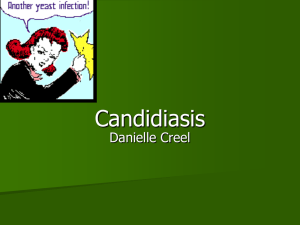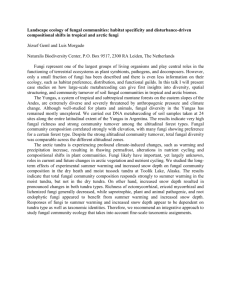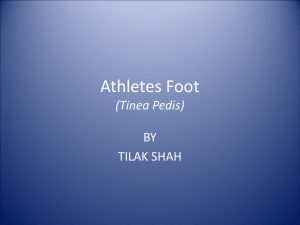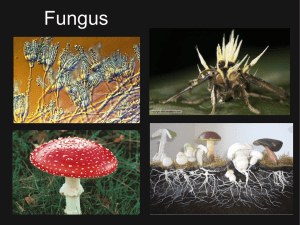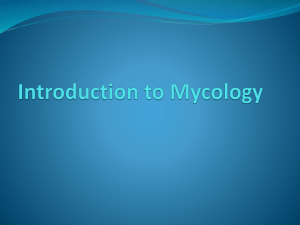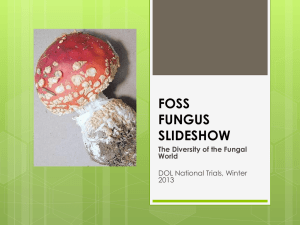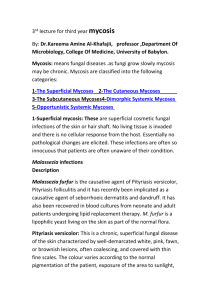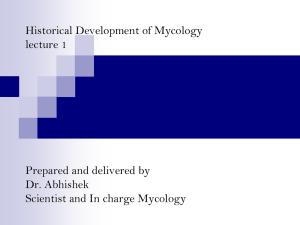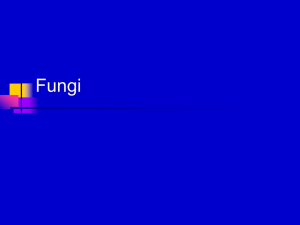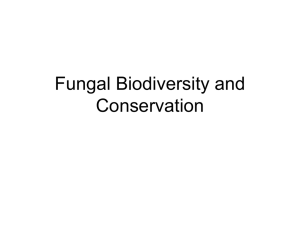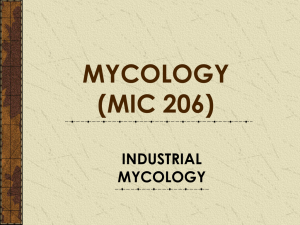Document
advertisement
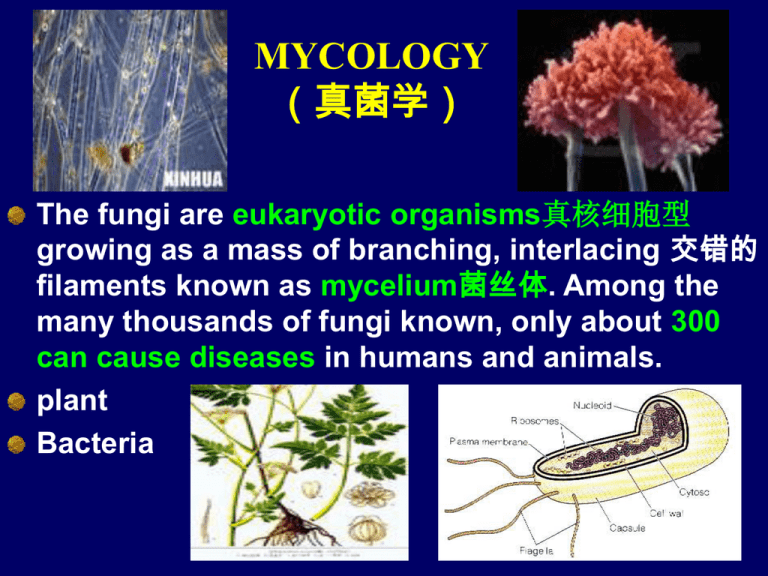
MYCOLOGY (真菌学) The fungi are eukaryotic organisms真核细胞型 growing as a mass of branching, interlacing 交错的 filaments known as mycelium菌丝体. Among the many thousands of fungi known, only about 300 can cause diseases in humans and animals. plant Bacteria ※Comparison of fungi and bacteria feature fungi bacteria diameter 4um 1um nucleus Eukaryotic真核的 Prokaryotic原核的 cytoplasm Mitochondria and Golgi apparatus , endoplasmic reticulum present Mitochondria and endoplasmic reticulum absent Cell membrane Sterols present有胆固醇 Sterols absent有胆固醇 Cell wall Chitin几丁质 Peptidoglycan, phospholipid spores Sexual and asexual spores for reproduction spores for survival, not for reproduction metabolism Require organic carbon; no obligate anaerobes专性厌氧 May do not require organic carbon; many obligate anaerobes Structure of fungi ※A. Morphology and Structure Unicellular fungi ( yeast 酵母菌) Multicellular fungi (filamentous fungus 丝状菌mold霉菌) Hypha 菌丝: mycelium菌丝体 ( vegetative营养, aerial气中 or reproductive生殖) Spores 孢子: 繁殖结构 sexual spore and asexual spore a) Conidium (分生孢子) : macroconidium, microconidium. b) Thallospore (叶状孢子) : blastospore芽生, chlamydospore厚膜, arthrospore关节 c) Sporangiospore (孢子囊孢子): Unicellular fungi Multicellular fungi Hypha spore 链霉菌菌丝 小分生孢子 大分生孢子 two main groups: ※yeasts and molds Yeasts : reproduce by asexual budding 出芽 Molds : a. Hypha b. Spore asexual cell division or sexual reproduction Dimorphic fungi 双相性: Several medical important fungi are dimorphic fungi. They are capable of converting from a yeast or yeastlike form to a filamentous form and vice versa 反之亦 然, usually exist in the yeast of yeast-like form in a mammalian body and as the filamentous form in the environment or general media. B. ※Culture ※ Sabouraud culture medium 沙保培养基 optimal pH 4-6 optimal temperature 22-28 ℃ some deep pathogenic fungi need 37 ℃ Aerobic需氧 ※ types of colonies – yeast filamentous Unicellular fungi (smooth, soft, compact 紧凑) Unicellular fungi Multicellular fungi ( floc絮状, villiform绒毛状, dusty飞扬 ) Multicellular fungi Resistance Resistant to dry, sunlight, UV light and many chemicals Sensitive to wet heat D. PATHOGENESIS致病性 Pathogenic fungal infection (浅部感染和深部感染) Opportunistic pathogenic fungal infection Fungal allergic diseases Mycotoxicosis真菌性中毒 Mycotoxin and tumor 真菌毒素与肿瘤 1. Pathogenic fungal infection For example, dermatophytes皮肤癣菌 ( colonizers of the skin, hair, and nails ) elaborate the enzyme keratinase角蛋白酶, which hydrolyzes the structural protein keratin. 2. Opportunistic fungal infection Some circumstance情况 that lead to infection the use of broadspectrum antibacterial drugs Weakness of the host by the use of therapeutic measures (e.g. x-ray irradiation, steroids, and other immunosuppressive抑制 drugs) alteration of the host's immune system (e.g. uncontrolled diabetes mellitus糖尿病, suppression such as that cause by AIDS). 3. Fungal Allergies Throughout life, the respiratory tract is exposed to airborne空气传播的conidia分生孢子and spores of many saprophytic腐生的fungi. These particles often possess potent 有效的 surface antigens capable of stimulating and eliciting引起 strong allergic reactions. In some cases both infection and allergy may occur simultaneously同时地. Depending on the site of deposition沉积作用 of the allergen, a patient may exhibit rhinitis鼻炎, bronchial asthma, alveolitis齿槽炎, or generalized无显著特点的 pneumonitis. Atopic 遗传 性过敏症的persons are more susceptible . 4. Mycotoxicosis Many fungi produce poisonous substances called mycotoxins that can cause acute or chronic toxicosis and damage. Mycotoxicosis may result from ingestion of fungal-contaminated foods. 5. Mycotoxin and tumor Aflatoxins黄曲霉毒素 produced by Aspegillus flavus黄曲霉 have become known as potent carcinogens致癌物质 . E.Immunity Nonspecific immunity Specific immunity Nonspecific barriers to fungal infection must be crossed, however, before specific immune responses to fungi are elicited. These primary barriers to fungal infection include intact skin, naturally occurring long-chain unsaturated fatty acids※, and competition with normal bacterial flora. In addition the mucous membranes are covered with fluids containing antifungal substances. Furthermore, many epithelial cells of the mucous membranes contain cilia that actively remove microorganisms. Both humoral and cell mediated immunity (CMI) are important in control of fungal infections, but CMI※ appears to be more important since patients with defects缺 陷 in CMI usually suffer more severe fungal infections than do persons with depressed降低的 humoral immunity. The cell-mediated immune response is protective; its suppression can lead to reactivation and dissemination再 发和扩散 of asymptomatic fungal infections and to disease caused by opportunistic fungi. Circulating IgG and IgM are produced in response to fungal infection, but their role in protection from disease is uncertain. F . Microbiological diagnosis Specimens Direct smear Isolation and cultivation Serological tests G. PREVENTION AND TREATMENT Prevention includes avoidance of environments and conditions conducive to fungal growth. The drugs used to treat bacterial diseases have no effect on fungal diseases. The effective drugs exploit 作用于 the presence of ergosterol麦角固醇 in fungal cell membranes. These drugs, i.e., amphotericin B and the various azoles. 总 结 真菌属于哪类微生物?与细菌有什么区别? 真菌的形态结构特点? 真菌的培养特点? 真菌致病作用有哪几方面? 真菌感染后以何种免疫性为主? MAIN PATHOGENIC FUNGI Superficial 表面真菌病 cutaneous皮肤真菌病 subcutaneous mycoses 皮下组织真菌病 systemic infections 系统真菌病 A.Superficial Mycoses 表面真菌病 Malassezia furfur (秕糠马拉癣菌) ◆Pityriasis versicolor花斑癣是由粃糠马拉癣菌感 染皮肤角质层引起的慢性感染 ◆ Discrete, serpentine, hyper- or hypopigmented maculae occur on the skin皮肤上出现分散、蜿 蜒、色素加深或减低的斑点 B.Cutaneous Mycoses-----Dermatophytes 皮肤真菌病 superficial keratinized tissue角化组织 infection,The most important are dermatophytes (皮肤癣菌), classified into 3 genera: Trichophyton (毛癣菌) Epidermophyton (表皮癣菌) Microsprum (小孢子癣菌) Invade only skin, hair, and nails. 1. Distinctive Properties: unable to grow at 37℃ or in the presence of serum . have developed keratinases角蛋白酶 , elastases弹性蛋白酶 , and other enzymes that enable them to be quite host-specific 宿主特异性 . Dermatophytes are identified by their colonial appearance菌落外形 and microscopic morphology after growth for 2 weeks at 25℃ on Sabouraud's agar 2. Pathogenesis: infected persons by direct contact. Microsporum 小孢子癣菌属 is also spread from animals. A single species → more than one type of infection A single infection → more than one species clinical manifestation They can causes tinea pedis足癣 (Athlete's Foot), feet; tinea unguium 甲癣 , nails; tinea corporis体癣 , body; tinea cruris股癣, groin; tinea manus手癣, hands; tinea capitis头癣, scalp hair; and tinea barbae须癣, beard hair. 3.Diagnosis: Scrapings被刮削下的碎屑of skin or nail →10% KOH on a glass slide show hyphae菌丝 under microscopy. Cultures on Sabouraud's agar at room temperature develop typical hyphae and conidia分生孢子 C.Subcutaneous Mycoses 皮下组织真菌病 Chromomycosis广色霉菌病 (caused by several species of black molds; Fonsecaea edrosoi, Cladosporium carrionii, Phialophora verrua have been isolated most frequently). D. Systemic mycoses 系统真菌病 (1)pathogenic fungi → ※Cryptococcus neoformans 新生隐球菌 Oval 椭圆的, budding yeast surrounded by a wide ※ polysaccharide capsule a.Distinctive Properties: its ability to grow at 37 ℃ the production of phenol oxidase苯酚氧化酶 b.Pathogenesis: Infection follows inhalation吸入 of the cell, which , in nature , are thought to be small , allowing the organism to enter deep into the lung. No human to human transmission The commonest manifestation is a subacute or chronic form of meningitis (隐球菌性脑膜炎 ) C. neoformans can be isolated in large numbers from pigeon droppings粪 in the environment c.Diagnosis: Tests for capsular antigen can be performed测试 on cerebrospinal fluid and serum. The latex slide agglutination test检测隐球菌抗原的 乳胶凝集试验 cerebrospinal fluid mixed with a drop of ※India ink, the yeast cell can be seen microscopically to be surrounded by a wide, unstained capsule. 脊髓液与一滴印度墨汁混和后 在显微镜下可见厚的、不着色 的荚膜 (2) Opportunistic Mycoses→ ※Candida(假丝酵母菌) Others: Aspergillus(曲霉) Mucor(毛霉) Pneumocystis carinii(卡氏肺孢菌) A. Candida Albicans (白色念珠菌) Candida albicans(白假丝酵母菌) is a yeast causing candidiasis (念珠菌病)or ※"thrush" (鹅口疮)in humans. ※C. albicans is part of the normal flora of the vagina and gastrointestinal tract As a superficial mycoses, candidiasis typically infects the mouth or vagina. Antibiotic treatment can also alter the normal bacterial flora allowing C. albicans to flourish活跃. 1.Distinctive Properties: oval, budding yeast cells. also form ※pseudohyphae . On nutritionally deficient media , produces large, spherical※chlamydospores 厚膜孢子 . 2.Pathogenesis: a. Cutaneous and Mucosal Candidiasis: 1.Oral thrush鹅口疮 can occur on the tongue, lips唇, gums齿龈 , or palate上颚 . Yeast invasion of the vaginal阴道 mucosa leads to vulvovaginitis外阴阴道炎 . 2.Other forms include invasion of the skin. occurs in moist, warm parts of the body such as the axillae腋下 , groin腹股沟 . The infected areas become red and moist and may develop vesicles泡 . 3. onychomycosis甲癣 . 口腔白念病 白念甲沟炎 红斑型白念病 白念食管炎 b. Systemic Candidiasis: 1. caused by indwelling catheters留置导管 , surgery, intravenous drug abuse 滥用, damage to the skin or gastrointestinal tract. 2.Patients with compromised phagocytic defenses细胞免疫缺陷 may develop occult lesions隐匿损害 anywhere, especially the kidney, skin, eye, heart, and meninges脑膜. c. Chronic Mucocutaneous Candidiasis: Most forms have onset发作 in early childhood, are associated with cellular immunodeficiency and endocrinopathies内分泌病 , and result in chronic superficial disfiguring损坏 infections of any or all areas of skin or mucosa. 3. immunity: Cell-mediated immune responses, especially CD4 cells, are important in controlling mucocutaneous粘膜与皮肤 candidiasis, and the neutrophil 嗜中性 粒细胞 is probably crucial至关紧要的for resistance to systemic candidiasis. 4. Diagnosis: Sputum Scrapings from lesions Blood smears Vaginal discharge 5. Prevention and Urine Treatment: Feces 标本: 拭子和表皮病损刮 Amphotericin B 取物、血液、脊髓液、组 Nystatin制霉菌素 织活检、尿液和渗出物等 Ketoconazole 苯并二氢呋喃酮 Fluconazole氟康唑 B. Other opportunistic mycoses (自学 ) 1. Aspergillus曲霉 2. Mucor毛霉 3. Pneumocystis carinii卡氏肺孢菌 总 结 致病性真菌可引起哪些类型的疾病? 引起系统性真菌病主要有什么菌? 新型隐球菌的染色特点?培养特点? 新型隐球菌引起的疾病? 白色念珠菌的结构特点? 白色念珠菌引起的疾病?
